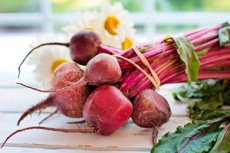Medical expert of the article
New publications
Can a nursing mom have red boiled beets?
Last reviewed: 04.07.2025

All iLive content is medically reviewed or fact checked to ensure as much factual accuracy as possible.
We have strict sourcing guidelines and only link to reputable media sites, academic research institutions and, whenever possible, medically peer reviewed studies. Note that the numbers in parentheses ([1], [2], etc.) are clickable links to these studies.
If you feel that any of our content is inaccurate, out-of-date, or otherwise questionable, please select it and press Ctrl + Enter.

Breastfeeding imposes certain dietary restrictions on a woman, since its ingredients get to the baby along with milk and can cause problems with the digestive system: bloating, loose stools, colic, diathesis. During this period, all conscientious mothers wonder whether this or that product will harm the baby. This question also arises about eating beets. On the one hand, it is a storehouse of vitamins and minerals, on the other hand, red vegetables and fruits can cause allergies. So can a nursing mother eat beets?
Benefits of beets
Beetroot is a unique vegetable in terms of the discrepancy between its useful qualities and price. This inexpensive product will surpass many expensive “brothers” in terms of the richness of its healing components. It has rightfully taken a leading position in the human diet, having begun its history many centuries ago on the Mediterranean coast and spreading throughout the world. The benefits of beetroot are hidden in its chemical composition: a large amount of proteins, vitamins B, PP, C, E, carotene, and folic acid. It contains a lot of iron, magnesium, calcium, iodine, potassium, and phosphorus. Together with fiber and organic acids, they have a beneficial effect on the digestive and vascular systems, the heart, including lowering blood pressure. The vegetable improves liver function, destroys pathogenic bacteria in the colon, removes radionuclides and toxins from the body, and is considered. Recent studies prove that it prevents the proliferation of cancer cells. Flavonoids stimulate the formation of red blood cells, increase the strength of capillaries.
From what month can you eat beets while breastfeeding?
The concerns that make nursing mothers refrain from eating beets are based on its laxative effect, high fiber content, and red color. But there are many more arguments in favor of the vegetable, so there is only one question left: from what month of a child's life can you eat it while breastfeeding. Doctors advise starting no earlier than 2-3 months. It should be introduced gradually, in small portions, observing the child's reaction. If there are no negative reactions, then increase the portion.
Beetroot dishes during breastfeeding
The greatest benefit comes from raw vegetables, but during lactation it is better to avoid them, at least for the first few months, because they contain volatile substances that can cause nausea, vomiting and general weakness. You can eat grated raw beets only after they have stood for some time, and it is better to avoid juices altogether. You can pass on all the nutritional properties of the vegetable to your baby through boiled beets. They are delicious grated on a coarse grater and seasoned with vegetable oil or simply cut into slices. Let's consider other recipes:
- borscht with beetroot — you should not give up this beloved dish of our national cuisine during feeding. Beetroot can be boiled in the broth in which borscht is cooked, then grated and returned, or sautéed in a frying pan, sprinkled with lemon juice. This will give the dish a beautiful rich red color;
- beet salads - baked beet will greatly improve the taste of salads. Cut into strips, add some prunes, dress with olive oil, squeeze a little lemon; you can make a more sophisticated salad by combining cubes of beet, cheese, preferably feta, a few prunes, pour oil over everything, sprinkle sesame seeds on top;
- beets with carrots - such a tandem will only enhance the vitamin arsenal. The greatest value of carrots is in the sufficient content of vitamin A, which is very useful for the eyes. The daily requirement for this vitamin is satisfied by just two medium-sized root vegetables. In addition, carrots control carbohydrate metabolism, normalize digestion, cleanse the cells of the kidneys and liver. For the salad, boiled beets and raw carrots are chopped, seasoned with oil, sourness can be added with lemon or, by adding grated apple, sprinkled with chopped walnuts;
- beets with garlic - sometimes mothers are afraid to eat garlic during lactation, fearing that its peculiar smell and taste will be transmitted through milk and discourage the desire to breastfeed. In fact, this is not true. Garlic has the right to enter the child's body due to allicin in its composition. This natural antibiotic will strengthen the immune system, protect against viruses. Garlic will not have any negative effect on the baby, because it is used in the salad in small quantities. To prepare it, beets are boiled and grated, a clove of garlic is passed through a garlic press, a little salted and for variety seasoned with low-fat sour cream.
The main rule that allows you to take advantage of the beneficial and nutritious properties of beets and not harm your child is not to use mayonnaise for salad dressing, not to eat spicy salads, such as Korean-style beets, and not to drink fresh beet juice.

